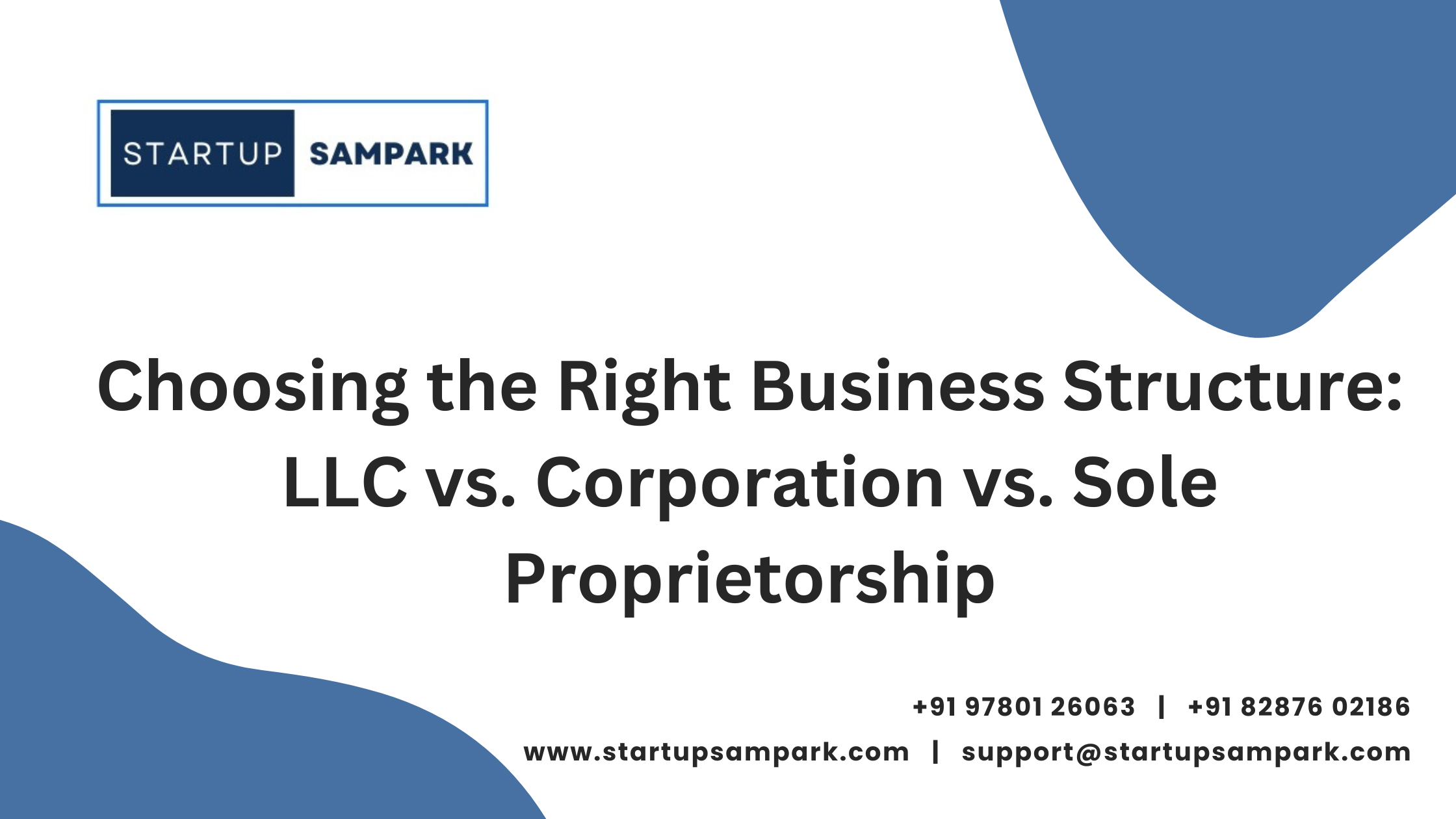Choosing the Right Business Structure: LLC vs. Corporation vs. Sole Proprietorship
Introduction to Business Structures in India
Choosing the right business structure is a critical decision for entrepreneurs in India, as it can significantly impact taxation, liability, and operational flexibility. The three most common business structures are Sole Proprietorship, Limited Liability Company (LLC), and Corporation. Each of these structures has its unique characteristics, advantages, and disadvantages. Understanding these differences is essential for making an informed choice that aligns with your business goals and operational needs.
Sole Proprietorship: Simplicity and Control
A Sole Proprietorship is the simplest and most common form of business organization in India. It is owned and managed by a single individual who retains complete control over the business. This structure is easy to set up, requiring minimal regulatory compliance and formalities. The sole proprietor is responsible for all debts and liabilities of the business, which means personal assets are at risk. While the simplicity of a sole proprietorship allows for quick decision-making and lower costs, it may limit growth potential and access to financing, as lenders often prefer more formal structures. Additionally, tax implications are straightforward, with income taxed as personal income, which can be advantageous for small-scale operations.
-
 Startup Registration (DPIIT Recognition)₹8,850.00
Startup Registration (DPIIT Recognition)₹8,850.00
Limited Liability Company (LLC): Balancing Flexibility and Protection
The Limited Liability Company (LLC) combines the benefits of a corporation with the flexibility of a partnership. An LLC in India is known as a Limited Liability Partnership (LLP), which offers limited liability protection to its partners, meaning that personal assets are shielded from business debts and liabilities. This structure is ideal for professionals and small businesses looking for a more formal arrangement without the complexities of a corporation. An LLP requires at least two designated partners, one of whom must be a resident of India. While compliance requirements are higher than those for a sole proprietorship, they are generally less stringent than for corporations. Moreover, LLPs have a more flexible management structure and provide the advantage of pass-through taxation, where profits are taxed only at the partner level.
Corporation: Structure for Growth and Investment
In India, a corporation is typically formed as a Private Limited Company or a Public Limited Company. This structure is suitable for businesses seeking substantial investment and growth. A Private Limited Company requires a minimum of two shareholders and has restrictions on share transferability, which can help maintain control among founders. Corporations offer limited liability protection, meaning shareholders are only liable for the company’s debts up to their investment. However, corporations face more stringent regulatory compliance, including statutory audits, filing annual returns, and maintaining proper corporate governance. Additionally, the taxation of corporations is at the entity level, and dividends distributed to shareholders are subject to tax, which can affect overall returns. Corporations are an attractive option for startups aiming to scale and attract venture capital or public investments.
Comparative Analysis of Liabilities and Taxes
When comparing the three structures, liability and taxation play a crucial role in the decision-making process. In a sole proprietorship, the owner bears unlimited liability, making it a risky choice for businesses with significant operational risks. In contrast, both LLCs and corporations provide limited liability protection, safeguarding personal assets from business debts. Taxation also varies significantly among the structures. Sole proprietors report business income as personal income, which may result in higher tax rates for higher earnings. Conversely, LLCs benefit from pass-through taxation, where profits are taxed at the individual partner level, avoiding double taxation. Corporations face a different tax regime, with profits taxed at the corporate level and dividends taxed at the shareholder level, potentially leading to higher overall tax burdens.
Choosing the Right Structure for Your Business
Selecting the appropriate business structure depends on various factors, including the nature of your business, growth aspirations, risk tolerance, and financial goals. For small businesses or freelancers, a sole proprietorship may offer the necessary simplicity and control. However, as businesses grow and seek external funding or partnerships, transitioning to an LLC or corporation can provide enhanced protections and opportunities. Entrepreneurs should carefully evaluate their business model, consider future scalability, and consult with legal and financial advisors to make an informed decision. Ultimately, the right structure will align with both current needs and future aspirations, laying a solid foundation for sustainable growth.
Conclusion: The Importance of Informed Decision-Making
Choosing the right business structure is a fundamental step in establishing a successful venture in India. Each option—sole proprietorship, LLC, and corporation—has distinct advantages and challenges that can influence your business trajectory. Entrepreneurs must consider factors such as liability, taxation, regulatory compliance, and growth potential when making this crucial decision. By understanding the nuances of each structure and seeking professional advice, business owners can position themselves for success and effectively navigate the complexities of the Indian business landscape.
startup
-
 Startup Registration (DPIIT Recognition)₹8,850.00
Startup Registration (DPIIT Recognition)₹8,850.00















Post Comment